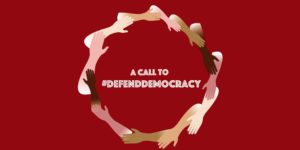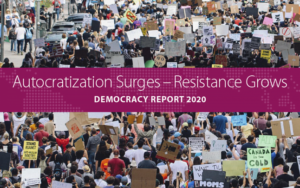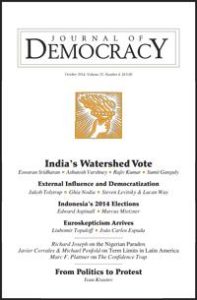 Should the U.S. re-commit to revitalizing current instruments for democracy assistance rather than allocating resources to a proposed Summit for Democracy?
Should the U.S. re-commit to revitalizing current instruments for democracy assistance rather than allocating resources to a proposed Summit for Democracy?
On its face, the agenda of the proposed summit – to “strengthen our democratic institutions, honestly confront the challenge of nations that are backsliding, and forge a common agenda to address threats to our common values”—seems straightforward enough, according to American University’s James Goldgeier, Senior Visiting Fellow at the Brookings Institution, and Duke University’s Bruce W. Jentleson, a former U.S. State Department official in the Obama and Clinton administrations.
But the policy conflates ideology with interests and risks incurring costs that outweigh its benefits. A new administration may find that the summit overloads its circuits at a demanding time, forcing the United States to wrestle with the complexities of determining an invitation list and bringing Washington face-to-face with resistance to the assumption that it is entitled to sit at the head of the table at global gatherings, they write for Foreign Affairs.
 The United States would be better served by focusing its attention on the smaller groupings of democratic allies and partners that already exist and by revitalizing its own instruments for promoting democracy and human rights, they assert, adding that the likes of the National Endowment for Democracy (NED), Millennium Challenge Corporation, Broadcasting Board of Governors, U.S. Institute of Peace, and other programs across the executive branch need support.
The United States would be better served by focusing its attention on the smaller groupings of democratic allies and partners that already exist and by revitalizing its own instruments for promoting democracy and human rights, they assert, adding that the likes of the National Endowment for Democracy (NED), Millennium Challenge Corporation, Broadcasting Board of Governors, U.S. Institute of Peace, and other programs across the executive branch need support.
Europe may prove to be the exception in welcoming Biden’s initiative, the Guardian’s Simon Tisdall contends. “We need to step up our action to defend democracy,” says Josep Borrell, EU foreign affairs chief, amid alarm over recent trends highlighted in the V-Dem Institute’s Democracy Report 2020. It asserts that for the first time since 2001, autocracy is the world’s leading form of governance – in 92 countries in total, home to 54% of the global population.
in welcoming Biden’s initiative, the Guardian’s Simon Tisdall contends. “We need to step up our action to defend democracy,” says Josep Borrell, EU foreign affairs chief, amid alarm over recent trends highlighted in the V-Dem Institute’s Democracy Report 2020. It asserts that for the first time since 2001, autocracy is the world’s leading form of governance – in 92 countries in total, home to 54% of the global population.
During the Cold War, US government leaders invested heavily in new instruments of soft power to contain communist ideas and promote democratic values (albeit often ignoring repressive dictatorships allied with us against the Soviet Union), notes Stanford University’s Michael McFaul, citing – amongst other initiatives – the National Endowment for Democracy and its affiliated organizations: the National Democratic Institute (NDI), the International Republican Institute (IRI), the Center for Independent Private Enterprise (CIPE), and the American Center for International Labor Solidarity (the Solidarity Center). The Biden Administration should follow suit, he writes for American Purpose and….
- …. establish a special “democracy dividend” fund that could provide immediate new resources to new leaders who come to power after democratic breakthroughs. USAID’s Office of Transition Initiatives should be vastly expanded and include more “reservist” democratic experts outside of government to be deployed to countries immediately after the collapse of dictatorships…..
- Second, the Biden Administration must devote greater effort to preventing backsliding and encourage a return to democracy by allies like Hungary, Turkey, Poland, India, and South Korea….
 Third, the Biden Administration should end the practice of providing direct assistance to NGOs in autocracies. The State Department should not be directly funding civil society organizations in Russia, China, Iran, Cuba, Venezuela, Saudi Arabia, or North Korea… Instead, as discussed below, other foundations not directly tied or controlled by the U.S. government should fund civil society activists abroad……..
Third, the Biden Administration should end the practice of providing direct assistance to NGOs in autocracies. The State Department should not be directly funding civil society organizations in Russia, China, Iran, Cuba, Venezuela, Saudi Arabia, or North Korea… Instead, as discussed below, other foundations not directly tied or controlled by the U.S. government should fund civil society activists abroad……..- Fourth, President Biden and his administration must commit to playing the long game of democracy promotion by investing in policies and programs whose payoffs will not be realized for decades. Ideas matter. Education matters. Greater resources should be devoted to educational programs that provide information about democracy, the rule of law, and liberalism more generally as well as to exchange programs that bring students and visitors from autocratic countries to the United States. ….. (For instance, every issue of the Journal of Democracy should be translated into multiple languages and made available free online.)
- Fifth, President Biden should state explicitly as a matter of policy in his 2021 National Security Strategy that the United States will not use military intervention to promote democratic regime change. The truth is that American presidents have almost never invoked democracy promotion as a justification for war; the U.S. military interventions in Grenada and Panama may be the only exceptions….. To compete with China and Russia in the 21st century, U.S. decision-makers must avoid ambitious, distracting projects like building democracies in countries that are at war or occupied by American soldiers.
- Sixth, our record on using economic sanctions to undermine autocracies and spark democratic change is also very thin. …. The Biden Administration should state explicitly that sanctions will be deployed to change the behavior of states, not to undermine them.
- Seventh, the administration should state explicitly that values will be a component of every bilateral relationship, especially with autocracies. Leaders in Beijing, Moscow, Tehran, and Pyongyang, but also Riyadh, Rabat, Amman, and Hanoi, must know that democracy, human rights, and the rule of law should be expected topics of any government-to-government meeting. President Biden should revitalize the dual track diplomacy—engaging both government and societies—he practiced as senator and vice president. RTWT
Every issue of @JoDemocracy should be translated into multiple languages and made available free online, @StanfordCDDRL‘s @McFaul writes for @americanpurpose https://t.co/Fapu03v7NV
— Democracy Digest (@demdigest) December 14, 2020







